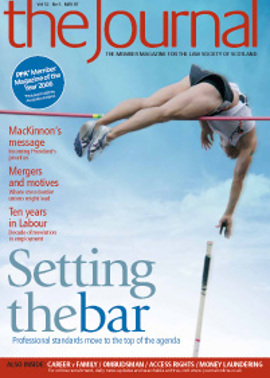Strategic advance

In many ways, putting together a summary of my year as President is a relatively straightforward task, such has been the dominance of the Legal Profession and Legal Aid (Scotland) Bill, now Act. A look through my earlier Journal columns indicated just how much time and effort was spent dealing with the proposals, from the initial consultation right through the Justice 2 evidence sessions to the conclusion of the legislative process.
The Society, along with many lawyers, shared a number of serious worries over issues such as cost, human rights compliance and maintaining the distinction between service and conduct complaints. There was, however, no more fundamental concern to me, and to many others, than the independence of the profession. Thanks to the combined efforts of the Society and the profession at large, the measures finally enacted were a considerable improvement on those first put forward. In this respect, huge credit must go to the bill team at the Society and all those solicitors, and others who, by making their strongly held views known to the Scottish Executive, ensured a better piece of legislation for Scotland.
Once the process was over it did, however, allow more time and effort to develop three other important themes which are likely to have a lasting effect on the profession and the Society.
In pushing forward the aim of improving communication, it was pleasing that the education and training consultation was the biggest ever carried out by the Society, with an excellent level of response from both the profession and the public. This will help to fashion a constructive debate on how lawyers of the future are educated, trained and obtain entry to the solicitors’ branch of the profession.
Now the likely legal framework is known, at least for the next few years, with the establishment of the Scottish Legal Complaints Commission, this has allowed the Society’s Council and Executive to develop a strategy which can dictate its future direction and development as an effective, relevant and innovative organisation leading a successful and prosperous profession that provides best advice to clients and protects the public interest.
This strategy is based on defining and communicating the standards of excellence that already exist across the profession, and building stronger and productive relationships with solicitors and the different sectors of the profession and its “stakeholders”. As has been said repeatedly, in all that it does, the Society must protect the public interest in its drive towards excellence and integrity so as to reinforce the badge of solicitor and so become the regulator of choice.
This is a very exciting and inspiring strategy and my thanks are due to the Council members on the working group – a practitioner from one of the largest firms, one from a medium sized firm, a sole practitioner and an in-house lawyer – together with a very able team from the Society’s Executive.
The Council enthusiastically endorsed the principles of this strategy, and I know my successor John MacKinnon and his deputy Richard Henderson also agree that, in demanding the best possible service for clients, we must also safeguard the reputation and interests of the profession and its core values. Their commitment to this project will ensure considerable continuity in the years ahead, and I wish them well in their determination to drive this and other worthwhile objectives forward.
A major plank of this strategy is the implementation of enforceable standards, and I draw readers’ attention to the article on p 10 by Richard Smith, the Interim Chief Executive of the Scottish Legal Complaints Commission. It is quite clear that the Commission will be constituted and begin work in earnest within the next six months, and to the extent that they perceive there is a vacuum or a lack of enforceable standards in place, it is likely they will dictate what these are to be. The profession already has standards and core values, but these require to be codified in a sensible way to develop minimum levels which can be built upon by practice units of different sizes and disciplines. This is appropriate, not just because of the creation of the Commission, but as part of the recognition of the Society’s own worth and value, and should lead to proposals being put to the autumn General Meeting of the Society.
I have received invaluable help and advice from many people, all of whom deserve my thanks. I know John and Richard will benefit from equally wise counsel and assistance, and wish them well.
In this issue
- Block fees: the story behind the changes
- Strategic advance
- Court plans with little appeal
- Under commission
- Two into one can go
- Ten years of labour
- Career v Family
- Monitor - at your own risk
- Raising the standard
- Society shapes the changes
- Society shapes the changes (1)
- Money laundering to change again
- Border and Immigration Agency launches
- Dealing positively with client concerns
- From the Brussels office
- Winning ways
- Toothless against spam?
- Risk reinvented
- Technical but essential
- Pension sharing tips on divorce
- In pursuit of simplicity
- In pursuit of simplicity (1)
- First in the class
- Scottish Solicitors' Discipline Tribunal
- Website reviews
- Book reviews
- On the road
- Access or excess?
- Alterations are no 2 problem
- ARTL: upgrade now for security






